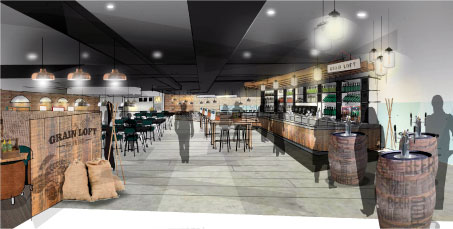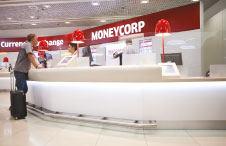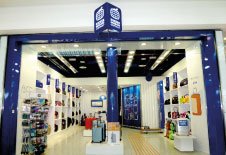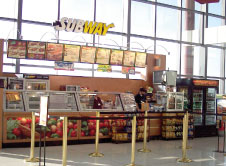
Self-service beer taps at SSP’s newly opened Grain Loft bar allow customers to manage their own time, while time-guaranteed dishes are ensured to arrive at the table in 13 minutes.
ACI EUROPE’s 22nd Airport Trading Conference and Exhibition this year addresses ‘Collaboration and innovation to enhance the volume and quality of commercial opportunities for the passenger’, in recognition of the parts that profitable partnerships, creative concepts and cutting-edge technologies play in non-aeronautical airport operations.
The ‘pay and stay’ airport dining revolution
“Airports are special places, in that the people who travel through them are a uniquely wide and diverse range of consumers, and the airport creates an atmosphere in which they are likely to be in a mind-set that makes them more experimental,” explained Mark Kassapian, Communications Director for SSP.
The opportunities presented by this unique category of consumer have been embraced by food travel expert SSP, whose innovative concepts for travel dining are engaging passengers worldwide in increasingly imaginative ways, while ensuring that airports meet the needs of travelling consumers and the growing movement towards a ‘pamy and stay’, complete dining experience.
SSP is pioneering the future of airport food & beverage – implementing the latest technologies and tapping into the most popular food trends. Fashionable roadside-style burger stand Shake Shack was recently introduced at John F. Kennedy International Airport, while self-serve beer taps at its newly launched Grain Loft bar at Manchester Airport put the traveller in control of their own time.
The company’s next step is the development of its ‘widening the shop window’ strategy, which offers beneficial new spending opportunities by building a relationship with the passenger before they arrive at the airport and continuing it after their visit.
“This means making people aware of the choice on offer at the airport and allowing them to pre-order,” Kassapian said. “It means engaging them when they are there, so that they remember us and come again, or encourage their friends to visit. An engaging experience also means that we can extend the offer – those who enjoyed a visit to a Montreaux Jazz Café may buy a t-shirt, while fans of Caffè Ritazza may want to purchase their own ‘Keep Cup’ to take home.”
Barrier-less currency exchange

Moneycorp will soon unveil its innovative new concept for airport foreign exchange, which will feature walk-through bureaux with sit-down lounges, hostess-service and in-store currency ordering via tablet.
Moneycorp secured nearly £63 million (€75m) in net income last year, when it traded more than £1 billion (€1.2bn) in currencies and conducted 2.4 million customer transactions. As well as expanding its exchange portfolio to over 100 world currencies in 2012, the UK-based independent currency broker introduced its own independent ATM facility and enhanced its reach within the airport sector, launching its White Label online travel money service in collaboration with airlines such as Virgin Atlantic and Ryanair, who will give it access to 13 million passengers every year.
From the end of the first quarter, Moneycorp will be embarking on a five-year residency as the sole foreign exchange provider at London-Gatwick Airport, for which it will double the size of its operations, increasing the number of foreign exchange bureaux in the airport’s North and South terminals from nine to 18, and the number of ATMs to around 40.
Now, Moneycorp’s goal is to change the face of airport foreign exchange with the development of its new retail concept. It will soon introduce walk-through bureaux, designed to remove the barriers between customer and corporation. The new design will incorporate sit-down lounges, hostess-service and easy-to-use technology to streamline the customer journey. The use of Cash Redemption Terminals, coupled with online currency ordering and in-store ordering via tablets are all part of Moneycorp’s strategy to revolutionise the bureau de change as we know it.
A self-contained store with a portable product
With over 100 airport locations across more than 30 countries, Subway has built an effective strategy for its airport dining experience, which combines speed, brand familiarity and product variety for continual growth. Last year the number of individual airport Subway stores rose by +10% to 146, and the first quarter of 2013 has seen, among others, the opening of the eighth Subway in a Chinese airport at Chengdu Shuangliu, and the third Subway store at Minneapolis-St Paul Airport.
The brand’s travel success can be partially attributed to the practicality of its product for a terminal environment. Around half of Subway’s airport installations come after airport security, and the portable nature of its sandwiches lends itself perfectly to being taken to the gate or eaten inflight. Subway’s flexible installation model also makes it attractive to airports, as its self-contained, kiosk format can occupy small spaces efficiently, and can be suitably accommodated in open spaces with no back wall. Wheeled furniture and branding that snaps into place mean a kiosk can be dismantled, moved and reassembled within 24 hours.
Liz Smethurst, Global Account Manager – New Business Development, said: “Subway offers healthy take-away alternatives to the fatty snacks you often find when travelling. That suits passengers because they can get something on the go, that’s good for them and can be made exactly to order. We are known for not cutting down our concessions ranges at all – it’s really important that a customer has the same experience at an airport as on the ground.”
Revenue opportunities throughout the passenger process

The Excess Baggage Company tailors baggage solutions to individual airports and their unique passenger needs. Baggage wrapping is widely used by passengers travelling to and from the Middle East, and Southeast Asia, while bag-weigh facilities will be welcome at airports with a large proportion of low-cost traffic.
The Excess Baggage Company’s storage, weighing and wrapping and courier solutions benefit both passenger and airport, alleviating the stress involved in one of the most burdensome aspects of the travel experience while providing opportunities for airports to capitalise on key parts of the passenger process to generate revenue.
“The airport can generate additional revenue by thinking creatively about adding extra services to the services it already has to provide,” explained David Elliott, Managing Director. “There are certain things an airport has to do – whether that’s operating check-in, giving passengers information, or helping passengers manage their luggage. Providing these functions has cost implications, but they can be turned into revenue streams.”
For instance, at check-in, facilities can be made available for passengers to buy more bags to repack overweight luggage to avoid airline penalty charges, while machines can be used to wrap a valuable suitcase or weigh luggage and check the excess cost before proceeding to bag-drop. At security, passengers can make use of a post-and-fly service to avoid losing a confiscated item.
In addition to its existing operations across the UK and Ireland, the Excess Baggage Company has recently begun operating nine bag weighing machines and a bag wrapping facility at London-Stansted Airport. These stand-alone machines can generate revenue from underutilised areas of a terminal, and, for the passenger, offer detailed information on airline baggage restrictions and advise on the published charges for airline excess baggage.
Customer-driven retail initiatives

In New York’s Greater Rochester Airport, Subway’s kiosk – a front counter and back wall menu board – stands freely in front of the terminal’s glass wall.
More than half of Dublin Airport Authority’s annual turnover is generated by non-aeronautical activities at its airports and overseas, and it is consistently developing new and inventive ways to improve the passenger experience through its commercial operations.
To meet customer needs and enhance the journey through Dublin Airport, DAA recently implemented two loyalty programmes; its Airport Club privileged passenger scheme – which offers frequent fliers advantages such as fast track access to airport security and discounted car parking – and Airport Genie, a purchasable suite of additional services such as assistance with luggage, chaperone, and access to executive lounges.
Customer-driven initiatives have also been deployed in retail at DAA airports, with an online shopping service for its The Loop retail facility proving very popular with passengers, enabling them to buy before they fly and pick up their purchases at the airport. Over 4,000 products including cosmetics, fragrances, alcohol and confectionery are available, and in a major coup for DAA, it is the first airport retailer in the world to sell Estée Lauder and MAC products via its online channel.
The Loop’s complimentary Shop & Collect service has also transformed the way consumers shop at Cork and Dublin airports, and is a highly successful service, with 2011 seeing +42% year-on-year growth in sales value.
At present, DAA is developing its five-year advertising sales strategy. New technology and digital advertising will form an integral part of this plan, along with experiential promotion opportunities which will allow brands to engage in a meaningful and interactive way with both passengers and airport customers.







